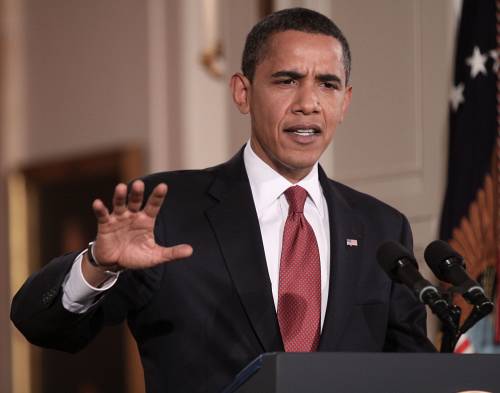Obama Immigration Proposal May Not Be at Odds With Economy
In a recession, can President Obama make the case for immigration?
Jul 31, 20206.9K Shares434.8K Views
President Barack Obama (WDCpix)
Last week, a senior aide to President Obama told The New York Timesthat the White House plans to support a comprehensive immigration reform bill that would offer a path to legalization for undocumented workers. But will Obama be willing to invest the political capital needed to pass such a bill during an economic crisis – when anti-immigrant sentiment is generally at its peak? After all, President George W. Bush couldn’t get Congress to pass a comprehensive immigration reform bill during his presidency even during an economic bubble; he faced too much opposition from within his own party.
Illustration by: Matt Mahurin
This time, advocates for comprehensive immigration reform that includes legalization for some undocumented workers – what restrictionists derisively call“amnesty” – are making the case that it isn’t just about being sympathetic towards foreign workers. It’s about improving the American economy, and raising wages and conditions for legal U.S. workers, they say — and it’s won support from the U.S. labor movementon a reform package. And though these calculations are always heavily debated, it does appear that this time, the advocates for immigrants have the data on their side.
Yesterday, the Immigration Policy Center (the research arm of the American Immigration Law Foundation) released a new report, “The Economics of Immigration Reform: What Legalizing Undocumented Immigrants Would Mean for the U.S. Economy.” The report is chock full of facts and figures showing that legalizing undocumented workers would “improve wages and working conditions for all workers, and increase tax revenues for cash-strapped federal, state and local governments.” Comprehensive immigration reform legislation would “pay for itself through the increased tax revenue it generates,” and newly legalized workers would be better positioned to move into higher paying jobs, pay higher taxes, and spend more on goods and services – all of which would serve as an economic stimulus to the economy.
The logic is simple. Legal workers earn on average 15 percent more than their illegal counterparts doing the same job, concludes a report done for the Department of Labor. Raising immigrants’ wages means they pay more in taxes, and have more money to spend in the economy. It also reduces the downward pressure on wages that’s long been exerted by the underground economy, where employers can skirt minimum wage and safety laws — which is why labor unions now support legalization, too.
Other studies of undocumented workers suggest similar gains. The Fiscal Policy Institute, for example, studying the construction industryin New York City, found that nearly one in four workers were working “off the books.” As a result, the federal government lost about $272 million in 2005 because employers didn’t pay Social Security, Medicare, workers’ compensation, unemployment insurance, and disability insurance, and another $70 million lost in personal income taxes. Although most studies have found that more than half of undocumented immigrants work on the books and pay federal and state income, social security and Medicare taxes, about half of them don’t. Legalization would collect taxes from everyone.
The impact on the cost of government services, however, is more controversial, with immigration restrictionists citing the heavy burdens that new immigrants place on social services systems. Still, most studies show that immigration ultimately leads to an overall increase in government revenue.
A study by the nonpartisan Congressional Budget Office, estimated that the cost of the immigration reform bill proposed in 2006 would have been more than offset by the benefits. Legalization would have generated $66 billion over ten years from income and payroll taxes, which would have more than paid for the $54 billion in spending on refundable tax credits, Medicaid, Medicare, Social Security and food stamps that the groups estimated the government would spend on newly eligible immigrants and their families.
Restrictionist groups, meanwhile, often cite an older study, from 1997, by the National Academy of Sciencesthat found that immigrants with no more than a high school education would initially cost the government more than they add in revenue. “If we’re talking about people in the [United States] illegally, we’re talking about people largely without more than a high school education,” said Steven Camarota, Director of Research for the restrictionist Center for Immigration Studies. The NAS study, he said, finds that an immigrant who comes to the United States without a high school education creates a net fiscal drain in his lifetime of $89,000, meaning he used that much more in services than he paid in taxes. If he has a high school education, the drain was lower, around $39,000. Those with more than a high school education, on the other hand, had a positive fiscal effect. According to a Pew Hispanic Center study released today, about 25 percent of undocumented immigrants fall into that category.
Nevertheless, a closer look at the National Academy of Sciences’ study shows a different picture. The study itself emphasizes the importance of taking a long-range view of immigration, rather than a one-year snapshot. Taking into account all of the various effects of immigration on the economy, including the effect on wages, demand, taxes and social services, the NAS actually foundthat immigration yields a gain in the overall economy – “on the order of $1 billion to $10 billion a year. Although this gain may be modest relative to the size of the U.S. economy, it remains a significant positive gain in absolute terms.”
That’s because over time, legal immigrants tend to work hard, get an education and advance themselves and their families economically. And that has a positive ripple effect throughout the economy.
“The U.S. economy is not a fixed pie,” said Dan Siciliano, Executive Director of the Program in Law, Economics and Business at Stanford Law School. “It is a dynamic economy that grows and shrinks depending on what’s going on.” Much of what drives growth has to do with the middle class, said Siciliano, who participated in a conference call of experts arranged by the Immigration Policy Center in conjunction with the release of its new report.
A path to legalization for undocumented workers also serves as a path to enter the middle class. “This is critical,” he said.
The problem with the current economy is the overall uncertainty, which decreases investment. “These problems are exaggerated and made worse if you’re undocumented,” said Siciliano. “Enfranchised consumers who are part of the above-ground economy are better consumers. You’re more willing to buy a home if you have certainty about your ability to stay in a community,” explained Siciliano. Immigrants are also more likely to invest in their own education and advancement, and that of their children, if they know they can stay and work where they are.
In addition to the fixed-pie perspective, opponents of legalization often assume that if the government does not legalize their status, immigrants will leave.
“What you sometimes hear is a kind of wishful thinking,” said David Kallick, a senior fellow at the Fiscal Policy Institute who also participated in the IPC conference call. “If undocumented immigrants just vanished, wouldn’t that mean there would be jobs freed up for US workers? But people don’t just vanish.” What’s more, if they did, it would “cause tremendous disruption in US businesses” which would “lead to fewer jobs to go around,” he said. “Mass deportation would be terrible for the economy. And it’s not real. It’s not going to happen.”
Not that mass deportation would be economical, either: the left-leaning Center for American Progress has found that deporting all undocumented immigrants in the U.S. would cost $41 billion a year.
Heavy spending on border enforcement alone also hasn’t kept people out. Even though spending on immigration enforcement more than tripled between 1993 and 2006, so has the number of undocumented immigrants in this country, notes the Immigration Policy Center in its report.
Administration officials say thatultimately, any comprehensive immigration reform package President Obama supports would include not only a path to legalization, but improved enforcement at the border and development of an improved national computer database that would allow employers to check the work eligibility of new job applicants. (The current system, called E-Verify, is not widely used and has been criticized as unreliable and inefficient.)
Still, Republican opponents of legalization, such as Rep. Steve King (R-Iowa), have vowed to fight any such bill, arguing that this is no time to increase competition for legal U.S. workers for scarce jobs. “In our current economic crisis, Americans cannot afford to lose more jobs to illegal workers,” King told the New York Times. “American workers are depending on President Obama to protect their jobs from those in America illegally.”
That labor unions, which have in the past expressed the same concerns, are now coming around to the immigration advocates’ side suggests a major shift in perspective about the potential impact of immigration reform on U.S. workers during a recession. We need an immigration system that is part of a national economic recovery program,” said Esther Lopez, Director of Civil Rights for the United Food and Commercial Workers’ Union.
Gerald Jaynes, a professor of Economics and African-American Studies at Yale, has also come around to supporting immigration reform, after years of resisting due to concern about the impact on low-wage workers.
“Several years ago I was convinced that immigration significantly lowered native wages and employment,” he said at the IPC conference, but added that “subsequently, my statistical analyses forced me to conclude otherwise.” (Here isJaynes’ testimony to Congress on the subject in 2007.) Although undocumented immigration has a slightly negative effect on native-born low-wage workers, he said, “the effects are relatively small, and in any event secondary to other causes of less educated workers’ dismal employment and wage experiences.” And because the work of immigrants often complements that of U.S.-born workers, “immigration can actually create jobs.”
Immigration reform that includes a path to legalization for undocumented workers, then, “is likely to improve conditions” of the overall workforce, he said, echoing one of the major themes that immigrants’ advocates are using to promote a reform package expected to be introduced this year. “One of the major problems for native workers of low education and skills is that they are competing against undocumented workers who employers are taking advantage of,” said Jaynes. “So to eliminate exploitation for the undocumented in effect eliminates or minimizes exploitation in American labor markets for all of the participants.”

Hajra Shannon
Reviewer
Latest Articles
Popular Articles

